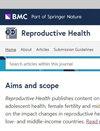Exploring comprehensive sexuality education experiences and barriers among students, teachers and principals in Nepal: a qualitative study
IF 3.6
2区 医学
Q1 PUBLIC, ENVIRONMENTAL & OCCUPATIONAL HEALTH
引用次数: 0
Abstract
Comprehensive sexuality education (CSE) is essential in empowering adolescents with the knowledge and confidence to manage their sexual and reproductive health. Despite its recognized benefits, access to quality CSE remains limited, especially in low-income countries, where societal norms and structural barriers hinder effective delivery. The aim of this study is to investigate the experiences and perceptions among students, teachers, and principals in Nepal about comprehensive sexuality education. Qualitative methods were used. 13 Semi-structured interviews and 1 focus group discussion were carried out with 15 teachers and principals working at higher secondary schools and two focus group discussions were conducted with a total of 13 adolescents. Thematic analysis was used to analyze the data. Four themes were developed: Resistance to Teaching and Learning, Preparation and Engagement Strategies, Taboos and Silencing and Structural Barriers. Students, teachers, principals and students reported discomfort and embarrassment when discussing sensitive topics, with gender dynamics playing a significant role. Strategies like warm-up sessions and continuous interaction with students and parents were used to create a supportive learning environment. However, socio-cultural barriers and family attitudes continued to hinder open discussions about sexuality. Structural barriers, including the lack of formal training for teachers and inadequate instructional materials, further impeded effective CSE delivery. The experiences of CSE in Nepal among students, teachers and principals highlight significant barriers including cultural taboos, gender dynamics and insufficient resources. Addressing these barriers through comprehensive teacher training, curriculum reform, and societal engagement is critical to ensure access to CSE.探索尼泊尔学生、教师和校长的全面性教育经验和障碍:一项定性研究
全面的性教育(CSE)对于增强青少年管理自身性健康和生殖健康的知识和信心至关重要。尽管全面性教育的益处已得到公认,但获得高质量全面性教育的机会仍然有限,尤其是在低收入国家,社会规范和结构性障碍阻碍了全面性教育的有效开展。本研究旨在调查尼泊尔学生、教师和校长对全面性教育的体验和看法。研究采用了定性方法。对 15 名高级中学的教师和校长进行了 13 次半结构式访谈和 1 次焦点小组讨论,并对 13 名青少年进行了 2 次焦点小组讨论。数据分析采用了主题分析法。形成了四个主题:教学阻力、准备和参与策略、禁忌和沉默以及结构性障碍。学生、教师、校长和学生都表示在讨论敏感话题时感到不适和尴尬,其中性别动态因素起了重要作用。我们采用了热身课、与学生和家长持续互动等策略来营造一个支持性的学习环境。然而,社会文化障碍和家庭态度仍然阻碍着关于性问题的公开讨论。结构性障碍,包括教师缺乏正规培训和教学材料不足,进一步阻碍了 CSE 的有效实施。在尼泊尔,学生、教师和校长在 CSE 方面的经验凸显了重大障碍,包括文化禁忌、性别动态和资源不足。通过全面的教师培训、课程改革和社会参与来消除这些障碍,对于确保获得 CSE 至关重要。
本文章由计算机程序翻译,如有差异,请以英文原文为准。
求助全文
约1分钟内获得全文
求助全文
来源期刊

Reproductive Health
PUBLIC, ENVIRONMENTAL & OCCUPATIONAL HEALTH-
CiteScore
6.00
自引率
5.90%
发文量
220
审稿时长
>12 weeks
期刊介绍:
Reproductive Health focuses on all aspects of human reproduction. The journal includes sections dedicated to adolescent health, female fertility and midwifery and all content is open access.
Reproductive health is defined as a state of physical, mental, and social well-being in all matters relating to the reproductive system, at all stages of life. Good reproductive health implies that people are able to have a satisfying and safe sex life, the capability to reproduce and the freedom to decide if, when, and how often to do so. Men and women should be informed about and have access to safe, effective, affordable, and acceptable methods of family planning of their choice, and the right to appropriate health-care services that enable women to safely go through pregnancy and childbirth.
 求助内容:
求助内容: 应助结果提醒方式:
应助结果提醒方式:


